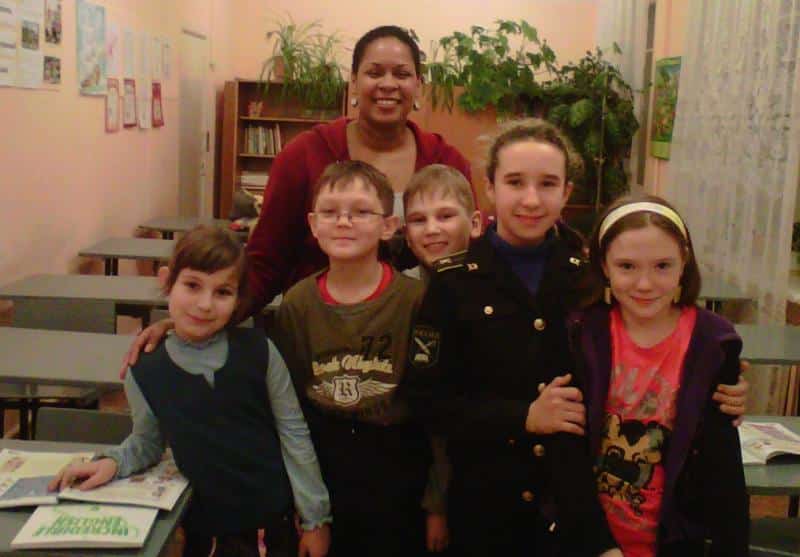
Imani Crawford
Founder, Black Bread
When did you first develop an interest in Slavic, East European, and Eurasian studies?
My interest in Russia and Russian language started in childhood (1980s Cold War kid). I was ALWAYS fascinated with the Soviet Union and the language, especially. In junior high school, I started teaching myself Russian and German from borrowed library books and was able to practice speaking with a multi-lingual elderly neighbor. My high school had an exchange program with School 45 in Moscow, and I lived with a Russian-Georgian host family during part of my senior year. Although I had been a short-term exchange student before (in Costa Rica, Sweden, and Portugal), the experience in Russia, especially, changed my life and led me to major in foreign languages and linguistics with a Russian minor at Georgetown University, where I studied Spanish, Russian, Portuguese, and French.
Tell us about your career trajectory.
My fields are international education & philanthropy, and I am an independent foreign language teacher & tutor of English, Spanish, and business English. I have now returned to the United States after teaching English in Prague for two years. I am also the founder of Black Bread, a professional network of Black American Russian-speakers and an online information hub.
Prior to this, I worked in politics, in legislative and communications roles on the House International Relations Committee on Capitol Hill, at the New York State Assembly, and at a few global non-profits. I wrote articles, policy briefs, speeches, and/or personal correspondence for two members of congress (Republican & Democratic), a NY state assemblyman, and a former U.S. president.
How has your knowledge of the East European and/or Eurasian regions, languages, and cultures assisted you in your career?
As a teacher, my familiarity with Russian language enables me to better help my Slavic students in Russia and the Czech Republic, understanding where and why they face specific challenges with English grammar, syntax, and other areas. My experience with Russian and Czech cultures allows me to bring more meaningful context into their language learning.
For Black Bread, my experience living in Russia multiple times for study, research, and work helps me relate to and anticipate many of the needs of Black Americans studying abroad and to understand where support is needed most. It also improves my ability to incorporate Russian and American cultural sensitivities into Black Bread programming for K-12 and university students in the US and Russia.
What advice do you have for those interested in a similar career?
Get TEFL-certified as soon as possible, especially if you are a native English speaker from the US or the UK, and even more so if you already know that you may be interested in some type of teaching career or education field degree (MA/PhD). Teachers with British or American nationalities and accents receive a massive (unearned) advantage in English language school recruitment, worldwide. TEFL-certification will provide exponential travel and expat opportunities while working. I cannot stress this enough. Do it!
Maintain and improve your foreign language skills on an ongoing basis, if possible. It will expand your applicant eligibility to many more funding and job opportunities. This doesn’t necessarily mean completing formal coursework. There are lots of other effective ways to boost your language skills. Basically, though, try not to let your language(s) get rusty.
What is your current work project?
I am currently working on a pilot program that will provide grants for college professors and K-12 teachers to engage their students with a Eurasian culture or country. The grants are for teachers of all subjects, not just Russian language, history, or literature.
I am also in the process of rebooting my long-dormant blog, AfroRusso, this fall. Upcoming posts will highlight the various experiences of Black people who have traveled to or lived in Russia and Eurasia, plus those here in the States with Eurasian heritage or other connections to the region.
What does your ASEEES membership mean to you? How has your involvement with ASEEES helped to further your career?
I am a new member of ASEEES, so I don’t have a long history of involvement with the organization. But its growing emphasis on welcoming people from outside of academia and, especially, the creation of the new BIPOC group has now made ASEEES feel like an inviting place for me. I’m really looking forward to networking and perhaps even collaborating with new people, knowing that we all share a passion for the same region of the world.
Besides your professional work, what other interests and/or hobbies do you enjoy?
I love making collages, attending and supporting community theater, and learning new languages – currently, American Sign Language and Czech. As for interests, anything having to do with whales, dolphins, or most other marine animals has my FULL attention. Thanks, in part, to my former idol, Jacques Cousteau, I used to want to be a marine biologist when I grew up!
